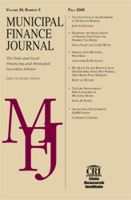Did Fiscal Outcomes and Government Employment Change Differently by Municipality Socioeconomic Status During the COVID-19 Pandemic? Evidence from New Jersey
Author: Michael S. Hayes.; Prakash Kandel.
Source: Volume 44, Number 02, Summer 2023 , pp.55-75(21)

< previous article |next article > |return to table of contents
Abstract:
The COVID-19 pandemic triggered a global health and economic crisis that profoundly affected subnational governments. Among them, New Jersey stood out as one of the hardest-hit states, grappling with a significantly high COVID-19 death rate. This study delves into the fiscal implications of the pandemic for New Jersey municipalities and investigates potential disparities based on socioeconomic status (SES). An analysis of a panel dataset for 532 unique municipalities from the fiscal years 2014–15 to 2020–21 finds no reduction in total revenues, total expenditures, or government employment for the average municipality in New Jersey. However, when considering SES, differential effects emerge. Lower SES municipalities received a 3% increase in state aid but experienced a 16% reduction in part-time public safety employees compared to higher SES counterparts. A high reliance on the property tax for local funding in New Jersey is one possible reason why municipalities across all SES levels were able to navigate the fiscal crisis caused by the pandemic.Keywords: New Jersey municipalities, socioeconomic status (SES), revenues and expenditures, COVID-19 pandemic, public safety employees
Affiliations:
1: Rutgers University-Camden; 2: Rutgers University–Camden.